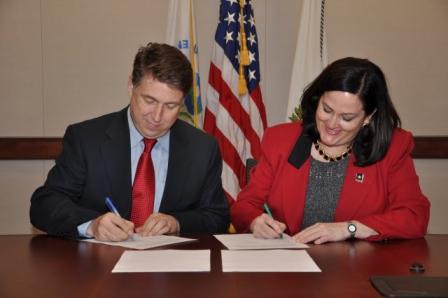Net Zero Partnerships
Advancing sustainability in communities, municipalities, and military installations requires an integrated, collaborative approach from multiple sectors. EPA has joined forces with several partners, including the military, universities, and communities across the U.S., to pool resources and multidisciplinary expertise while working together towards achieving the shared goal of Net Zero Water, Energy, and Waste.
Military Partnerships
 EPA's Paul Anastas and Katherine Hammack, the assistant secretary of the Army for Installations, Energy, and the Environment, sign a memorandum of understanding to collaborate on the Army's Net Zero Initiative on Nov. 28, 2011 at EPA headquarters. (Photo credit: U.S. Army)EPA has partnered with the U.S. Army and the U.S. Department of Defense (DoD) to advance the sustainability goals of Net Zero/Net Positive (NZ/NP) energy, water, and waste. EPA scientists and engineers are using cutting-edge research to develop technology and tools to help military installations and communities find ways to reduce their water, waste, and energy footprints while fostering economic growth and promoting citizen health and well-being. Successful NZ/NP strategies and technologies can be applied and adapted to achieve greater sustainability and resiliency in military installations and communities across the country and worldwide.
EPA's Paul Anastas and Katherine Hammack, the assistant secretary of the Army for Installations, Energy, and the Environment, sign a memorandum of understanding to collaborate on the Army's Net Zero Initiative on Nov. 28, 2011 at EPA headquarters. (Photo credit: U.S. Army)EPA has partnered with the U.S. Army and the U.S. Department of Defense (DoD) to advance the sustainability goals of Net Zero/Net Positive (NZ/NP) energy, water, and waste. EPA scientists and engineers are using cutting-edge research to develop technology and tools to help military installations and communities find ways to reduce their water, waste, and energy footprints while fostering economic growth and promoting citizen health and well-being. Successful NZ/NP strategies and technologies can be applied and adapted to achieve greater sustainability and resiliency in military installations and communities across the country and worldwide.
Campus and Community Partnerships
EPA works with universities and communities to introduce them to the successful Campus-Community Sustainability Partnerships (CCSP) model and other EPA tools and approaches for advancing sustainability. In the CCSP model, a university (campus) provides direct support to a city (or other local governmental organization) to achieve the city’s self-identified sustainability goals, particularly in attaining net zero energy, water, and waste. The CCSP program enables local governments to execute their sustainability-related projects in an affordable manner while university students learn through hands-on problem solving and develop valuable skills. By facilitating these partnerships, EPA gains a direct route to provide academic expertise and support to campuses and communities working toward their Net Zero goals. The long-term objective is to establish mutually beneficial partnerships that help communities become more sustainable and resilient, build capacity, and provide university students with real-world experiences.
